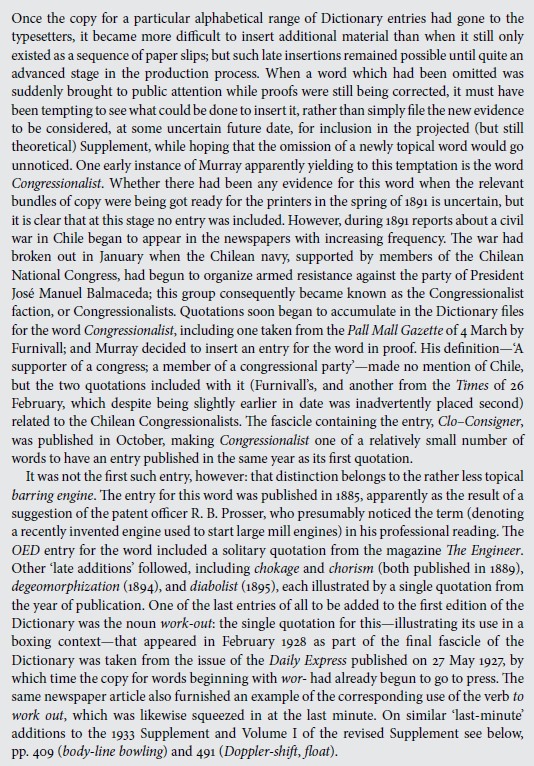The OED documented the verb to Google in a 2006 update, eight years after the first occurrence of this sense in print (1998, in eGroups, an old mailing list). Happy slap and derivatives also took eight years to get in, appearing in 2013. Ditto paywall (published 2012), sext (2015), retweet (2015), and Schmallenberg virus (2019). Omnishambolic (2019) and live-blog (2013) took nine years; mansplain (2019) and Youtuber (2016) took ten.
Ten years is a relatively short span between first attestation and first appearance in OED. It can take decades or even centuries for OED to pick up and publish a “new” word, even after it has been established in the language. Plenty are simply overlooked–or are ignored–by earlier editors, only to be added in later revisions. And resources are limited, meaning even that many recent words just have to wait.
One word that did not have to wait was Covid-19, invented by the WHO in February 2020 and published on OED.com in April 2020. It’s the only word I can find in OED3 with a publication lag of zero years (0.17 years?).
 That’s lightning fast by OED standards, and was motivated no doubt by the social relevance of the term (and presumably the number look-ups on OED.com: people tend to look to the dictionary for meaning, as well as meanings). Indeed, in the hodge-podge of terms I mentioned above, it’s clear that new words produced by social and technological movements or events are common among quickly-documented words (viruses do well too).
That’s lightning fast by OED standards, and was motivated no doubt by the social relevance of the term (and presumably the number look-ups on OED.com: people tend to look to the dictionary for meaning, as well as meanings). Indeed, in the hodge-podge of terms I mentioned above, it’s clear that new words produced by social and technological movements or events are common among quickly-documented words (viruses do well too).
A similar profile can also be discerned in the list I’ve reproduced below, of all OED entries published within ten years of the date of first attestation, where the date of the attestation is Y2K or later (i.e. after OED3 began to publish quarterly revisions).
The dates in parentheses refer to the publication date of the entry–just subtract the lag time to arrive at the date of first attestation.
-3 Year lag (wtf?)
e-skin (2001)
1 Year lag
Norovirus (2003)
2 years
SARS (2005)
3 years
twerking (2015)
4 years
Brexit (2016), Grexit (2016), flerovium (2016), livermorium (2016), podcast (2008)
5 years
chip and PIN (2006), copernicium (2014), Fl (2017), Lv (2017), phablet (2015), whoonga (2015), yarnstorm (2015)
6 years
geocache (2006), geocache (2006), geocaching (2006), jeggings (2015), neurodivergence (2019), pop-under (2006), Rg (2010), roentgenium (2010), Sudoku (2006), tenderpreneur (2015), yarn bomb (2015), yarn bombing (2015), yarnstorm (2015)
7 Years
blogosphere (2009), clicktivism (2016), crowdfund (2015), crowdsource (2013), crowdsourcing (2013), free runner (2010), free running (2010), galactico (2010), hashtag (2014), hawaladar (2007), photobomb (2015), photobomb (2015), photobomber (2015), photobombing (2015), retweeting (2015), satoshi (2019)
8 years
cissexism (2015), clickjacking (2016), crowdfunded (2015), crowdfunding (2015), dubstep (2010), e-cig (2015), e-cigarette (2015), goji (2010), happy slap (2013), happy slap (2013), happy slapper (2013), happy slapping (2013), Mamil (2015), parkour (2010), paywall (2012), retweet (2015), retweet (2015), Schmallenberg virus (2019), sext (2015), showrooming (2017), traceur (2011), tweeting (2015)
9 Years
blue state (2009), defriend (2013), Eris (2015), fatberg (2017), glamp (2016), iPod (2010), listicle (2016), live-blog (2013), live-blogging (2013), lumbersexual (2018), mansplainer (2018), omnishambolic (2019), optogenetics (2017), reggaeton (2010), Sahelanthropus (2011), totes (2015), Twitterati (2015), unlike (2017), Wag (2011), yarn bomb (2015), zama zama (2015)
10 years
ace (2018), adipokine (2011), clicktivist (2016), darmstadtium (2013), Ds (2013), e-liquid (2018), flash mob (2013), glamper (2016), goldendoodle (2011),
hashtag (2018), Kenyanthropus (2011), live blog (2013), locavore (2015), machinima (2010), mansplain (2018), omnishambles (2019), Orrorin (2011), sexting (2015), simples (2019), sportive (2015), stan (2018), YouTuber (2016)
Tranferred from another “platform”:


Here’s a guess what at happened with e-skin: The September 2001 update included new entries for e-, comb.form. (first citation 1988), and words formed from it, including e-book (1988), e-business (1995), e-cash (1994), E-fit (1988), e-money (1993), e-tailer (1995), e-tailing (1995), e-zine (1994), as well as e-skin. But e-skin has been modified since: “most recently modified version published online March 2018”. I’ll bet they originally had an older citation, but found some error in it and pulled it.
Another reason why we need change-tracking!
@kts yes, it must have been something of that nature. I’m not sure about the back-end, but the front end has never been set up to account for such revisions. We’ll see if it improves (having disimproved quite dramatically with this “latest online version” stuff). A full-on track changes would be really useful, but it will take some work to do right.